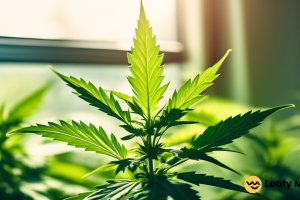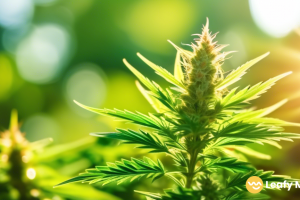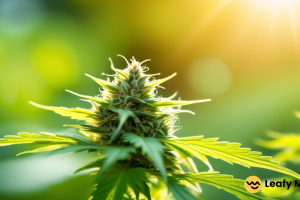In the symphony of sleep, a maestro is gaining increasing attention: Cannabidiol or CBD. This non-psychoactive compound derived from the Cannabis plant has captivated researchers and sleep enthusiasts, promising harmonious nights filled with restful slumber. This ultimate guide takes you through a nocturnal journey, exploring the interplay between CBD and sleep, illuminating the science and potential benefits, and navigating the considerations and pitfalls.
The Science Behind Sleep: An Overview
Sleep, a state of rest and rejuvenation, is a biological imperative, as essential as the air we breathe or the food we consume. But what is the science behind it? The human sleep cycle is an intricate ballet of brain activity, divided into two fundamental stages: Non-Rapid Eye Movement (NREM) and Rapid Eye Movement (REM) sleep.
NREM sleep comprises about 75% of our slumber and has three sub-stages. The first, light sleep, serves as a transition from wakefulness, slowing our heart rate and reducing body temperature. The second, true sleep, deepens our slumber, making us less responsive to the outside world. The final stage, deep sleep or slow-wave sleep, is when the magic happens – tissue growth and repair, immune system strengthening, and the consolidation of memories and learning.
REM sleep, often associated with vivid dreams, is a paradoxical state. While our bodies are immobile and relaxed, our brains buzz with activity, almost like being awake. This phase is thought to play a role in learning and mood regulation.
These stages aren’t static but flow in a cyclical pattern throughout the night, regulated by our internal biological clock, circadian rhythm, and a sleep-inducing hormone called melatonin. Sleep is the body’s symphony, and understanding its rhythms and patterns is key to enhancing its quality and benefits.
Deciphering the Role of CBD in the Human Body
Cannabidiol, or CBD, is one of over 100 phytocannabinoids found in the cannabis plant, appreciated for its potential therapeutic effects without the high of its infamous cousin, THC. But how does it work within the human body?
CBD’s broad range of influences stems from its interaction with the endocannabinoid system (ECS). This complex cell-signaling system plays a role in maintaining the body’s internal balance or homeostasis. This system involves three key components: endocannabinoids (our body’s naturally produced cannabinoids), receptors (where these cannabinoids bind), and enzymes (which break down cannabinoids once they’ve done their job).
CBD doesn’t bind to these receptors directly like THC does. Instead, it works more like a maestro, subtly influencing the ECS to increase the production of our body’s own endocannabinoids, particularly anandamide, often termed the ‘bliss molecule’ for its role in pain, depression, appetite, memory, and fertility.
CBD interacts with other receptors, like serotonin and vanilloid receptors, affecting mood, pain perception, and inflammation. By doing so, CBD can potentially influence many biological processes, including sleep.
Understanding CBD’s role in the body is like decoding an intricate melody. While we’ve started to unravel some notes, there’s still much to learn about this complex and fascinating compound.
CBD and the Sleep-Wake Cycle: A Biological Symphony
Sleep and wakefulness are not random occurrences but a rhythmically orchestrated biological symphony conducted by our internal body clock, or circadian rhythm. This cycle relies heavily on hormonal cues, environmental light exposure, and internal biological processes. Amongst these processes is the nuanced interplay of the endocannabinoid system (ECS), which CBD influentially interacts with, potentially tuning the harmony of our sleep-wake cycle.
Research suggests that CBD may influence sleep by impacting the levels of certain neurotransmitters in the brain. For instance, it appears to regulate the release of cortisol, a stress hormone that can interfere with sleep. CBD may also interact with receptors in the brain that govern the body’s daily sleep/wake cycles, offering potential assistance to those with sleep disorders that disrupt these rhythms.
Furthermore, CBD may also influence the REM stage of sleep, a phase associated with dreaming and memory processing. Studies indicate that CBD may decrease REM sleep latency, meaning it might help us enter this dream stage quicker, potentially enhancing the restorative aspects of sleep.
Understanding How CBD Interacts with the Endocannabinoid System
To understand how CBD interacts with the endocannabinoid system (ECS), we need to think of the ECS as an orchestra, with its components playing together to maintain the body’s harmony. The ECS consists of endocannabinoids, receptors, and enzymes, all playing crucial roles in this concert.
Like a skilled conductor, CBD doesn’t play an instrument directly but influences the orchestra’s performance. CBD doesn’t bind directly to the primary cannabinoid receptors, CB1 and CB2, like THC. Instead, it increases the body’s levels of endocannabinoids, particularly anandamide, by inhibiting the enzyme that breaks it down.
CBD also interacts with non-cannabinoid receptors like the serotonin receptor 5-HT1A and the vanilloid receptor TRPV1, which are involved in processes such as mood regulation, pain perception, and inflammation. CBD can potentially exert its effects on various physiological processes, including sleep regulation, through this multi-target approach.
Potential Benefits of CBD for Sleep Disorders
Sleep disorders disrupt the sweet symphony of sleep, leading to a cacophony of health issues. Here is where CBD steps in, potentially offering several benefits for various sleep disorders.
For insomnia, CBD may help by addressing some root causes. It’s believed to ease anxiety and pain, common culprits behind sleeplessness. Furthermore, preliminary research suggests that CBD may increase overall sleep and improve insomnia.
CBD may offer potential benefits for REM sleep behavior disorder (RBD), a condition where people act out their dreams, often leading to poor sleep and injuries. Early research has shown that CBD can reduce REM sleep disturbances and nighttime disturbances in people with Parkinson’s disease, who often experience RBD.
For excessive daytime sleepiness, CBD may hold potential. While it may seem counterintuitive given its possible benefits for insomnia, CBD might promote wakefulness during daylight hours, assisting in maintaining the balance of the sleep-wake cycle.
While the research is promising, it’s still in the early stages. The symphony of CBD’s benefits for a sleep disorder is still being composed, and more clinical trials are needed to confirm these preliminary findings.
The Use of CBD for Insomnia: A Closer Look
Insomnia, the relentless night thief, robs millions of people of their much-needed rest. Many are turning to CBD as a potential remedy. But why? How does CBD act in the nocturnal landscape of insomnia?
Insomnia can often be a symptom of other issues, such as stress, anxiety, and chronic pain. Interestingly, these are areas where CBD has shown potential therapeutic benefits. CBD’s interaction with the serotonin and vanilloid receptors may help modulate mood and pain perception, addressing some of the causes of insomnia.
Beyond this, CBD may influence our sleep cycle directly. Preliminary research suggests that CBD could increase the amount of overall sleep and reduce the frequency of nighttime awakenings. Some studies have also shown that CBD could reduce REM sleep latency, which might help individuals enter the dream stage more quickly and spend more time in restorative sleep.
However, most research to date has been preclinical or based on small-scale studies. While the results are promising, more extensive clinical trials are necessary to fully understand CBD’s role in managing insomnia.
CBD and REM Sleep Behavior Disorder: The Dream State Connection
Rapid Eye Movement (REM) sleep behavior disorder is a curious phenomenon where individuals physically act out their dreams, leading to disrupted sleep and potential injury. This disorder is common in people with neurodegenerative conditions like Parkinson’s disease. But how does CBD fit into this dream state narrative?
In normal circumstances, our bodies are in a state of muscle atonia (near-paralysis) during REM sleep, preventing us from physically responding to our dreams. However, this mechanism is impaired in conditions like REM sleep behavior disorder.
Early research indicates that CBD might play a role in managing this disorder. One clinical study involving Parkinson’s patients revealed that CBD intake significantly reduced the frequency of REM sleep behavior disorder events. It’s believed that CBD’s interaction with the endocannabinoid system might help regulate REM sleep and restore the natural paralysis that should occur during this stage.
These findings suggest that CBD could be a valuable ally in the fight against REM sleep behavior disorder. However, as with other areas of CBD research, more comprehensive studies are needed to understand the exact mechanisms and potential benefits fully.
Can CBD Help with Sleep Apnea? Current Research Findings
Sleep apnea is a sleep disorder marked by repeated interruptions in breathing during sleep, leading to poor sleep quality and daytime fatigue. It is a serious condition associated with several health risks, including hypertension and heart disease. While there is significant interest in exploring the potential of CBD for sleep apnea, the research is still in its infancy.
Early preclinical studies suggest that cannabinoids may positively affect sleep apnea due to their influence on serotonin-mediated apneas. However, it’s important to clarify that most of this research uses synthetic cannabinoids, not CBD specifically.
A clinical trial on dronabinol, a synthetic form of THC, showed reduced severity of sleep apnea. Still, we cannot extrapolate these findings to CBD due to their differing pharmacological profiles. Currently, we do not have sufficient evidence to suggest that CBD can help with sleep apnea. Further research is needed to explore this potential.
CBD and Circadian Rhythm: Synchronizing our Biological Clocks
Our circadian rhythm is an internal biological clock that regulates the timing of sleep and wakefulness. It is influenced by external cues like light, temperature, and internal processes, including the endocannabinoid system. Interestingly, recent research suggests that CBD might play a role in maintaining this rhythm.
The endocannabinoid system has been found to modulate the circadian rhythm in several areas of the brain and body. By interacting with this system, CBD might help synchronize our biological clocks, potentially improving sleep quality and consistency.
For example, a study on rats demonstrated that CBD increased the activity of the wake-promoting neurons during daylight hours, leading to more activity during the day and better sleep at night. While research in this area is still new, these findings point to the potential role of CBD in maintaining our circadian rhythm and promoting healthier sleep-wake cycles.
Examining the Role of CBD in Reducing Anxiety and Stress-Related Sleep Issues
Anxiety and stress are like noisy intruders disrupting our peaceful slumber. They are known culprits behind various sleep issues, including insomnia. The potential of CBD in managing anxiety and stress-related sleep disturbances is a growing area of interest.
CBD has been shown to interact with serotonin receptors in the brain, which are crucial in regulating mood and anxiety. By influencing these receptors, CBD may help to reduce anxiety levels, potentially aiding in better sleep.
In a 2019 study involving 72 adults with anxiety and poor sleep, CBD improved both conditions for most patients within the first month of treatment. These improvements were sustained over the duration of the study.
The potential of CBD to address stress-related sleep issues might be due to its influence on the hypothalamic-pituitary-adrenal (HPA) axis, which regulates our stress response. By mitigating the stress response, CBD may promote a night of more restful and uninterrupted sleep.
While these findings are promising, more robust clinical trials are needed to fully comprehend the role of CBD in managing anxiety and stress-related sleep issues.
How to Use CBD for Sleep: Dosage and Delivery Methods
When it comes to how much CBD to use for sleep, there are a few factors to consider: dosage, timing, and delivery method. Dosage varies greatly among individuals, influenced by factors such as body weight, metabolism, and the severity of sleep issues. Most experts suggest starting with a low dose (around 5-10 mg of CBD) and gradually increasing it until you find what works best.
Timing is another key factor. Some people find taking CBD about an hour before bed helps them fall asleep more easily. In contrast, others may benefit from taking smaller daily doses to assist with relaxation and stress management.
There are several delivery methods available, each with its advantages. Tinctures and oils provide a direct, efficient way to consume CBD and allow precise dosing. Edibles, such as gummies or chocolates, provide a tasty and discreet option, although they take longer to take effect due to the digestion process. Vapes offer the fastest onset of effects, while topicals like balms and lotions can be applied directly to the skin.
The Safety Profile of CBD: Are There Side Effects?
CBD is generally considered safe with a good side-effect profile. However, like any other substance, it can cause adverse reactions in some individuals. Common side effects include dry mouth, diarrhea, reduced appetite, drowsiness, and fatigue. It can also interact with certain medications, so discussing with your healthcare provider if you’re currently on any medication is crucial.
Additionally, while CBD is non-intoxicating, products, especially full-spectrum ones, may contain trace amounts of THC, which could potentially cause psychoactive effects or show up on drug tests. Choosing CBD products from reputable sources is vital, as the market is currently not well regulated. Look for third-party lab-tested products to ensure your safety and side effects are well known.
Legal Aspects of CBD: What You Need to Know
While CBD is widely available in many parts of the world, its legal status varies. In the United States, CBD derived from hemp (containing less than 0.3% THC) was federally legalized by the 2018 Farm Bill. However, state laws can vary, with some still restricting the use of CBD.
Internationally, laws also differ greatly, with some countries fully legalizing CBD, others allowing it under strict conditions, and some banning it entirely. If you’re considering CBD, it’s essential to research the laws in your specific area.
CBD is legal, though it’s not currently regulated by the FDA (except for the prescription drug Epidiolex). This means that product quality can vary, and products might not contain the amount of CBD they claim.
Comparing CBD with Other Natural Sleep Aids
While CBD has promising potential as a sleep aid, it’s not the only natural remedy. Other substances like melatonin, valerian root, chamomile, and lavender have long been used to promote restful sleep.
- Melatonin is a hormone naturally produced by our bodies in response to darkness, signaling it’s time to sleep. Melatonin supplements can be particularly helpful for those struggling with jet lag or shift work.
- Valerian root is another popular herbal supplement used for insomnia. Like CBD, it interacts with GABA receptors in the brain, promoting relaxation.
- Chamomile and lavender, often used in teas and essential oils, have calming effects that may help with mild sleep issues or promote overall relaxation.
Compared to these, CBD stands out for its broad array of potential benefits, promoting sleep and addressing underlying issues like anxiety disorder, posttraumatic stress disorder, chronic pain, and other sleep disorders that can interfere with sleep.
Moreover, while substances like melatonin and valerian root can cause drowsiness, CBD may help regulate proper sleep and the central nervous system without causing daytime sleepiness, a common issue with many sleep aids.
Can CBD Affect Sleep Patterns if It Stays in Your System for a Long Time?
CBD can affect sleep patterns depending on how long CBD stays in your system. Research suggests it can help with sleep, but the duration of its effects may vary. Factors like dosage, frequency of use, and individual metabolism can influence how long CBD stays in your system.
Personalizing Your CBD Sleep Regimen: Tips and Recommendations
Regarding a CBD product geared towards enhancing sleep quality, there are many options, including full-spectrum, broad-spectrum, CBD isolate products, CBD gummies, CBD sleep capsules, and even topical applications such as bath bombs. Here are some top picks, all with a good reputation for quality and effectiveness.
- Sweet Sleep CBD Oil by Charlotte’s Web: This full-spectrum CBD oil is specifically formulated to support sleep. It combines CBD with melatonin and other natural sleep-promoting ingredients. The oil also contains a blend of cannabinoids, flavonoids, and terpenes, all derived from hemp plants grown on American farms.
- Broad Spectrum CBD Oil by Joy Organics: This broad-spectrum oil benefits you from various cannabinoids and terpenes minus the THC. It’s available in different flavors, including tranquil mint, which can be soothing before bed. Joy Organics also uses nanoemulsion technology, which may increase the bioavailability of CBD.
- CBDistillery CBD Isolate Oil: These hemp-derived CBD products are an excellent choice for those who prefer its purest form, without other cannabinoids or terpenes. The CBDistillery’s isolate oil is made from non-GMO industrial hemp and is certified by the U.S. Hemp Authority.
- cbdMD CBD PM for Sleep: This unique blend combines broad-spectrum CBD with melatonin and other sleep-inducing herbs. It’s intended to provide a restful night’s sleep and comes in a convenient tincture form.
- Life Elements CBD Bath Bomb: A bath before bed can be a great way to relax and prepare for sleep, and adding a CBD bath bomb might enhance this effect. Life Elements offers bath bombs with full-spectrum CBD and various soothing essential oils.
Remember, CBD may work differently for everyone, and it’s important to consult with a healthcare professional before starting any new supplement routine. Also, make sure to choose products from reputable companies that provide third-party lab test results to ensure the product’s safety, potency, and quality.
Conclusion: CBD Sweet Dreams
As we emerge from our voyage through the realm of CBD and sleep, it is apparent that this compound holds the potential in orchestrating a harmonious sleep pattern. While the intricate relationship between CBD and our body’s biological systems is still being explored, the initial symphony of findings suggests a promising role for CBD as a natural sleep aid.
However, like any piece of music, it requires fine-tuning. Further research, regulation, and understanding are necessary before fully appreciating the maestro’s capabilities. Until then, this guide serves as a compass, directing you through the starlit mystery of CBD and sleep, encouraging harmonious dreams, high-quality sleep, and restful nights.











Leave a Reply